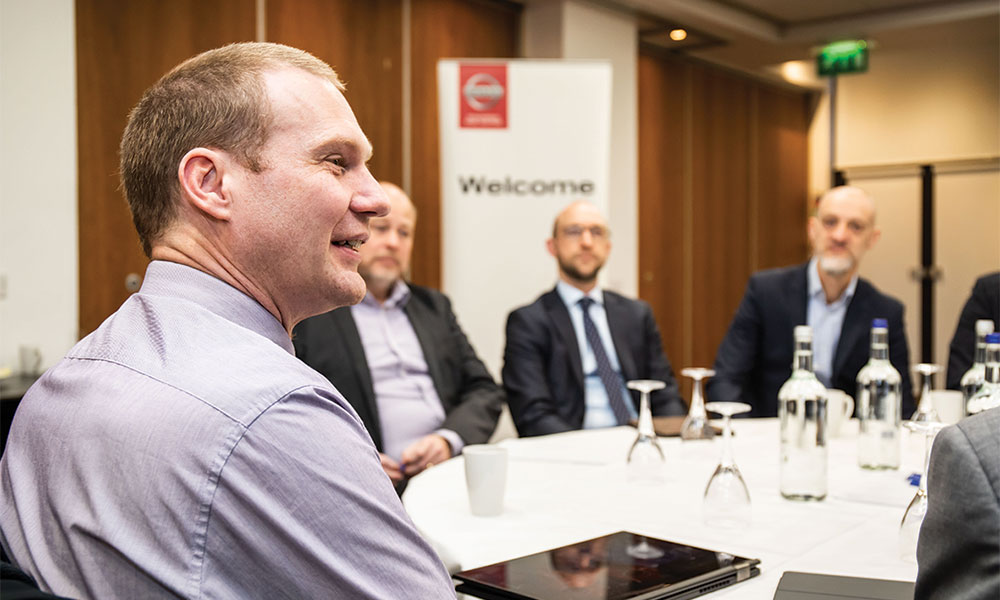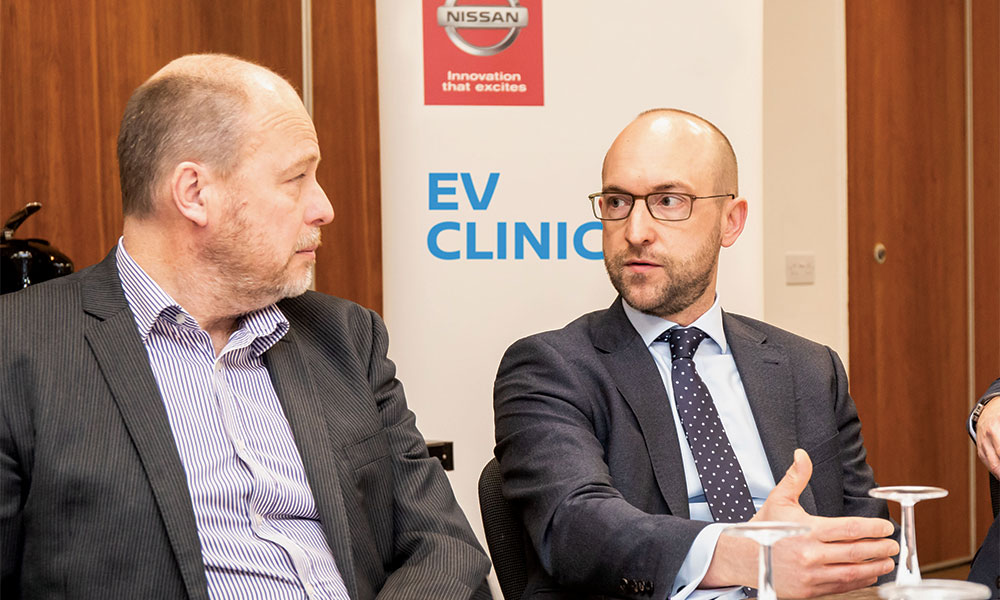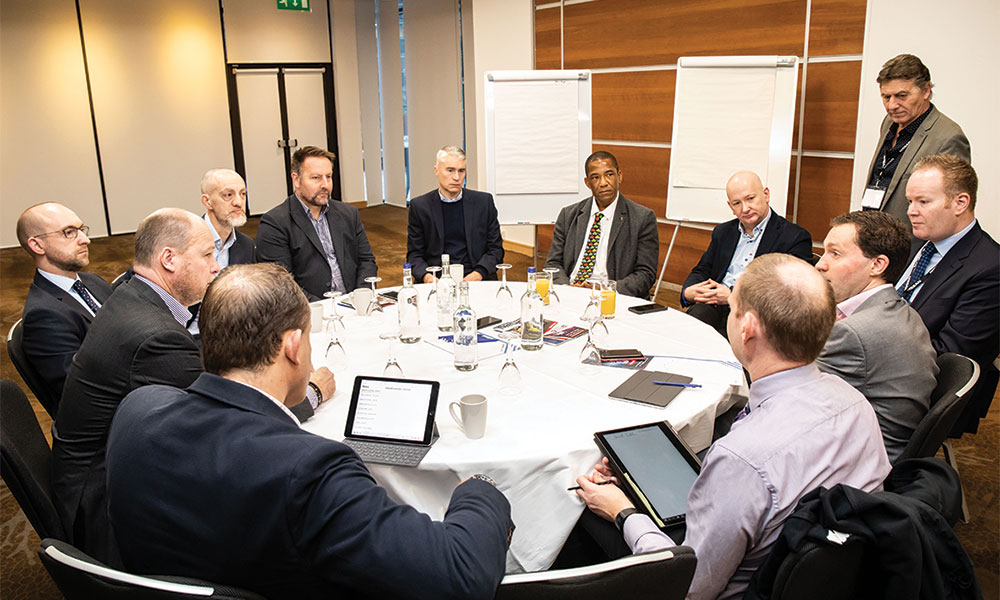EV FORUM
LOOKING TO THE FUTURE... BREAKING DOWN EV BARRIERS
As electric vehicles take a foothold in the UK, EV Fleet World engaged with enlightened fleet managers, with a view to optimising fleet mobility.
Following a conversation with Nissan’s fleet director Peter McDonald at the end of 2019, we discussed how there’s not enough literature that helps support fleets becoming electrified.
There are lots of challenges and myths, and as a population of fleet professionals, we need to share information and knowledge and understand how those challenges can be overcome.
So, EV Fleet World assembled a round table of fleet professionals comprising: Kevin Booker, IT systems & fleet, Brecon Beacons National Park; Chris Chandler, principle consultant, Lex Autolease; Jason Coleman, national account manager Northumbria Healthcare NHS Foundation Trust; Adam Connelly, national corporate sales manager at Nissan; Mark Johnson, national leasing manager at Nissan; Keith Cook, fleet manager, Computacenter; Leroy Thomas, contract manager, Affinity Water; David Watts, Arval consultant; Kevin Welstead, EV director at SSE and Nissan’s fleet director, Peter McDonald.

“The more information we give employees, the more ammunition they have to make the right choice”
Leroy Thomas Contract manager Affinity Water
THE PANEL

If we’re talking about businesses taking EVs, and there are blockers, what role can the manufacturers play in assisting with that? We come across people who want EVs, but they’ve not got the infrastructure in place, so what role can we now play?
“I’d probably say volume is one thing, because from the people I’m talking to, particularly the fleet market, they’re trying to get everything in line and it’s generally the volume or lead times which are causing issues. A lot of people want to electrify now, particularly in the small van sector – for example delivery vans. They need understand when they are going to get vehicles, so they can plan their investment, and the infrastructure.”
Kevin Welstead
“A few years ago we were used to three-month lead times. 12 months is too long because you’re trying to plan a year ahead. Apart from Nissan who has EV stock, the shortest lead times I've found on lots of vehicles is nine months, and we’re almost starting to plan the next lease when starting the first one.
“More recently, we’ve had to do lease extensions because vehicles haven’t arrived in time. Not one or two-months, but sometimes a year’s extension, which is uncomfortable, as you can get into wear and tear issues and end up negotiating with the lease company on maintenance costs. Lead times are key.”
Kevin Booker
“I think it manifests itself in two ways. Firstly, a lot of leasing companies tend to contact drivers six-months before the vehicle is changed, to let the driver think – ‘what vehicle am I going to get?’. Then they start looking at vehicles, and 10 to 14 weeks is the typical lead time. If the vehicle isn’t going to come for eight to 12 months and you’re in a four-year contract, you could be running a vehicle for five-years.
“The second issue is, if someone is looking to introduce electric cars to their company car policy but then you’re saying that you can’t get the car due to lead times, you start annoying what are effectively your customers.”
Chris Chandler
What does best practice look like then? Evidently when there’s reasonable supply, you’re confident to put EVs on your lists. How do you differentiate?
“One of the problems is the model ranges are quite limited still, although we know that’s due to accelerate. The physical number of models available that would fit with typical company car drivers, is very limited.
“You’ve then got this broader perception EVs are difficult to get hold of, which is true to a certain degree but that’s the same as any other car. We’ve always experienced long lead times on certain models, for petrol and diesel models - my last car was a nine-month lead time! We just accept that as it’s a fact of life, but because it’s an EV, and there’s a small number of models, it becomes really heightened.”
David Watts
“Availability is going to improve because more and more manufacturers like Nissan are putting aside larger chunks of production to electric. But we are in a transition period, and I think the thing that has really brought it to focus, is the new BiK race. Even people who haven’t wanted electric vehicles before, are saying that if it’s going to save me X hundred per month, sign me up.” Kevin Welstead: “We’ve not had a non-EV order in the business, since that announcement. The reason why Norway has 65% EVs, is because of incentivisation for several years. So that’s the way to stimulate the market.”
Chris Chandler
“This is where the education comes in for user-chooser employees, ensuring they’ve done their homework, to make sure they’re aware of the local infrastructure. Can they put a home charging point in?
“I think the lead times will improve, but not in time for drivers who are paying tax on a £6,000 or £10,000 benefit; they will desperately want to get into a position where they’re paying zero BiK.”
Jason Coleman
“Vehicle battery degrading
is an absolute myth”
Kevin Welstead – EV Director SSE
We’ve exposed a supply problem and I guess there’s a tipping point for these things and it’s getting better. What does a fleet do in the next three or four months?
“What we’re doing, is when our employees are looking at the invitation to order - we’ve now extended that from six-months to nine, or 10-months in advance. If they select an electric vehicle, they know it’s going to be a long time, and they can plan for that. Education is a big part of it, we provide a lot of information about the vehicles, their ranges, their lead times, the BiK and tax information. The way we see it, the more information we give employees, the more ammunition they have to make the right choice.”
Leroy Thomas
“Some drivers can deal with the lead time. But, if they can’t get access to the technology that they want i.e. if they can’t home charge and there’s no public or work charging infrastructure, to me that’s a bigger barrier to access.”
Keith Cook
“Only 8% of drivers have the ability to home charge. So, you’ve got to provide something different. Either something in their street, but you’ve got to understand the stakeholders that we’re dealing with, they don’t want charge points all over the street.
“The big issue is hubs, as for fleet drivers it’s going to be a whole dynamic change. The convenience of doing something at home is going to change, and you’re probably going to find the way you operate a fleet is going to be different.”
Kevin Welstead
“I think it’s important to recognise the business approach and the messaging. If it’s a choice-based policy, my general position is that an EV will work for every single company car driver out there today. It doesn’t matter where they live, what their personal journeys or business journeys are like and whether they can charge at home. It is just a spectrum of how easy or hard it is for them, and then how willing they are to deal with the hard bits. If you can charge at home, clearly, it’s a million times easier than if you can’t. We need to get away from this message, that EVs are only suitable for certain drivers, with certain profiles.”
David Watts
How much should the fleet manager be advocating EV? If they do, what does that look like in best practice?
“I think there always needs to be a parallel strategy with what the organisation is trying to do to promote electric vehicles - with what the employees need to do.
“On-site there’s the argument they were going to have to put charge points in the workplace. It is not untypical for me to go to a hospital site that has 6,000 staff on one site and there’s two charging points for all the staff and customers. It’s a bit different for local authorities, they’re a bit further ahead of the game, but the NHS is playing catch up. I had one customer recently that wanted to go full-EV, and I talked him out of it. Instead, I told him to look a few years ahead, as maybe we’re pushing people down the route of electric, but they live in a flat and work in the community - that is kind of hopeless. Everyone can use an EV, but is it time or cost effective for every individual?”
Jason Coleman






What does best practice look like in terms of how you advocate it, but also that the right person qualifies?
“We’re still working on it. It is easy on a one-to-one level, when someone rings into the office, that’s fine we have a discussion. But that’s small fry, when we’re doing 200 cars per week. We’ll maybe get a few hundred calls into the office, but not everyone’s calling in to qualify. They’re just deciding on ordering a car. We do offer an electric charging point at the point of ordering - if it’s a full EV. So, we’re saying, here you go, there’s loads of T&Cs attached, but what we haven’t conquered is the education piece. Is there a great website to look at in your own time? The emphasis is now on the user-chooser to say, it’s really for you to decide. My utopia would be, that they have so much information that they can’t not make an informed decision.”
Jason Coleman
“I did something that was very simplistic really, it’s a fuel decision tree. You ask the question and it moves you to the next question. It asks you about home chargers, the type of journeys you do, and the type of mileage that you do. For a complete novice, that knows nothing about EVs, we found out that our customers really valued this and put it in their policy document.
“Some people just need some questions answering that might seem really obvious to us – they just want to know the simple information. Working through something like a decision tree, can spark their interest, they might think this could work for me and then they go to the next level”.
David Watts
How do you accelerate EV learning? You have advocates, but everyone is at a different rate of adoption. What help or support can you provide in liberating that knowledge?
“It’s providing as much content as you can. Half the battle is there’s a lot of media content out there from a variety of sources, whether it’s the press, suppliers, whatever that might be, who are regurgitating the same incorrect or misleading messages.”
David Watts
“The other one is battery degrading, it’s an absolute myth. The degrading of the battery is nowhere near where they were predicting, because they projected so conservatively. That technology will only transfer to the car market.”
Kevin Welstead
“People underestimate that electric vehicles are less efficient in winter and your range will fall. It is the seasonal variance that’s more important, than battery degradation. My view is don’t worry about your air-con, worry about the ambient temperature outside. Luckily in the UK we don’t have that much of a swing. There’s enough evidence that EVs are actually more reliable than traditionally fuelled models.”
Chris Chandler
“This is where I’ve seen quite an exodus, a lot of people have gone for the cash, but if they’re locked into a vehicle and they’re in the wrong geographic area, they’re going to find themselves with a problem. I’m not too stressed about people taking the cash, but I see a lot of people coming back to the company car, driven by zero emissions and BiK.”
Keith Cook
“Just to pick up on the home charging point. Home charging is ideal in terms of making it a lot easier for people. But, it’s also about cost consideration as well, because of the 4p re-imbursement at home, it just about seems to work. I do 30,000 miles per year; I’d be reliant on Superchargers and things like that. It’s the economic argument - if there’s a tax effect above 4p, it will be interesting to see what happens.”
Jason Coleman
“I think there’s a lot of information out there, and part of what we have to do is gather it and put it together. All water companies have made a pledge to be carbon neutral by 2030, that’s a massive target. We have a carbon reduction strategy working group, so it’s not just about vehicles, it’s about all the energy.”
Leroy Thomas
“A lot of our clients are wanting to track the renewable part of the energy, so they get the carbon credits. We’re even back to building mass solar farms. After the subsidies no one built solar, but the technology has moved on so much in the last 10-years, that we’re building large 50, 60, 100 watt solar farms, up North where people didn’t generally build them, and you can get the same yield as people in Cornwall or Devon, and then we find we’re putting in sleeving arrangements. So, they’re controlling the cost, which is a lot cheaper, then they can absolutely say that they can put their carbon credits on the table and be 100% green. That’s going to become more and more prominent because what’s around the corner in terms of legislation. So, that’s going to be an impact at a commercial level, as the Government is going to have to recover some of the cost of the BiK.”
Kevin Welstead
WHAT WE LEARNT
Takeaways for fleets
• Lead times for EVs are too long, and there isn't the model choice to satisfy fleet needs – yet!
• Lease extensions are becoming more popular, with drivers waiting on average 12 months for their new EVs.
• An EV can work for every single company car driver, it’s just a spectrum of how willing they are to deal with adoption.
• More information is needed for fleet drivers in the mass adoption of EV models.
• A lot of media is providing incorrect or misleading messages.
• It is not just about choosing an EV fleet, it’s making sure the infrastructure is there to support mass charging.
